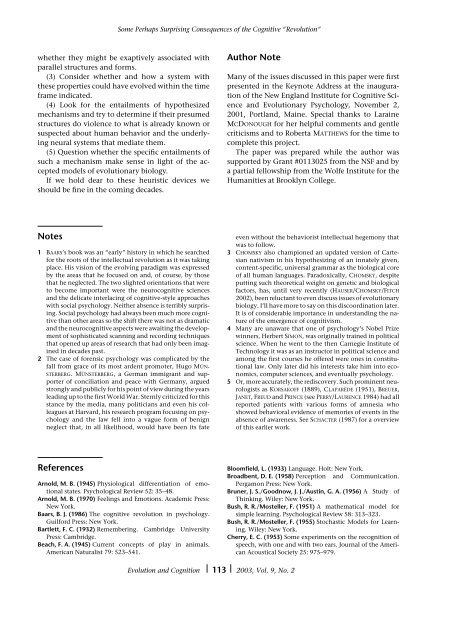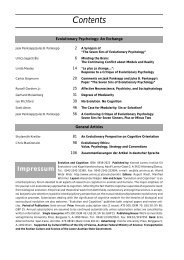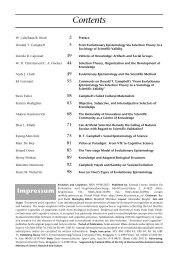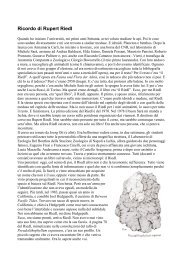Contents - Konrad Lorenz Institute
Contents - Konrad Lorenz Institute
Contents - Konrad Lorenz Institute
You also want an ePaper? Increase the reach of your titles
YUMPU automatically turns print PDFs into web optimized ePapers that Google loves.
Some Perhaps Surprising Consequences of the Cognitive “Revolution”<br />
whether they might be exaptively associated with<br />
parallel structures and forms.<br />
(3) Consider whether and how a system with<br />
these properties could have evolved within the time<br />
frame indicated.<br />
(4) Look for the entailments of hypothesized<br />
mechanisms and try to determine if their presumed<br />
structures do violence to what is already known or<br />
suspected about human behavior and the underlying<br />
neural systems that mediate them.<br />
(5) Question whether the specific entailments of<br />
such a mechanism make sense in light of the accepted<br />
models of evolutionary biology.<br />
If we hold dear to these heuristic devices we<br />
should be fine in the coming decades.<br />
Author Note<br />
Many of the issues discussed in this paper were first<br />
presented in the Keynote Address at the inauguration<br />
of the New England <strong>Institute</strong> for Cognitive Science<br />
and Evolutionary Psychology, November 2,<br />
2001, Portland, Maine. Special thanks to Laraine<br />
MCDONOUGH for her helpful comments and gentle<br />
criticisms and to Roberta MATTHEWS for the time to<br />
complete this project.<br />
The paper was prepared while the author was<br />
supported by Grant #0113025 from the NSF and by<br />
a partial fellowship from the Wolfe <strong>Institute</strong> for the<br />
Humanities at Brooklyn College.<br />
Notes<br />
1 BAARS’s book was an “early” history in which he searched<br />
for the roots of the intellectual revolution as it was taking<br />
place. His vision of the evolving paradigm was expressed<br />
by the areas that he focused on and, of course, by those<br />
that he neglected. The two slighted orientations that were<br />
to become important were the neurocognitive sciences<br />
and the delicate interlacing of cognitive-style approaches<br />
with social psychology. Neither absence is terribly surprising.<br />
Social psychology had always been much more cognitive<br />
than other areas so the shift there was not as dramatic<br />
and the neurocognitive aspects were awaiting the development<br />
of sophisticated scanning and recording techniques<br />
that opened up areas of research that had only been imagined<br />
in decades past.<br />
2 The case of forensic psychology was complicated by the<br />
fall from grace of its most ardent promoter, Hugo MÜN-<br />
STERBERG. MÜNSTERBERG, a German immigrant and supporter<br />
of conciliation and peace with Germany, argued<br />
strongly and publicly for his point of view during the years<br />
leading up to the first World War. Sternly criticized for this<br />
stance by the media, many politicians and even his colleagues<br />
at Harvard, his research program focusing on psychology<br />
and the law fell into a vague form of benign<br />
neglect that, in all likelihood, would have been its fate<br />
even without the behaviorist intellectual hegemony that<br />
was to follow.<br />
3 CHOMSKY also championed an updated version of Cartesian<br />
nativism in his hypothesizing of an innately given,<br />
content-specific, universal grammar as the biological core<br />
of all human languages. Paradoxically, CHOMSKY, despite<br />
putting such theoretical weight on genetic and biological<br />
factors, has, until very recently (HAUSER/CHOMSKY/FITCH<br />
2002), been reluctant to even discuss issues of evolutionary<br />
biology. I’ll have more to say on this discoordination later.<br />
It is of considerable importance in understanding the nature<br />
of the emergence of cognitivism.<br />
4 Many are unaware that one of psychology’s Nobel Prize<br />
winners, Herbert SIMON, was originally trained in political<br />
science. When he went to the then Carnegie <strong>Institute</strong> of<br />
Technology it was as an instructor in political science and<br />
among the first courses he offered were ones in constitutional<br />
law. Only later did his interests take him into economics,<br />
computer sciences, and eventually psychology.<br />
5 Or, more accurately, the rediscovery. Such prominent neurologists<br />
as KORSAKOFF (1889), CLAPARÈDE (1951), BREUER,<br />
JANET, FREUD and PRINCE (see PERRY/LAURENCE 1984) had all<br />
reported patients with various forms of amnesia who<br />
showed behavioral evidence of memories of events in the<br />
absence of awareness. See SCHACTER (1987) for a overview<br />
of this earlier work.<br />
References<br />
Arnold, M. B. (1945) Physiological differentiation of emotional<br />
states. Psychological Review 52: 35–48.<br />
Arnold, M. B. (1970) Feelings and Emotions. Academic Press:<br />
New York.<br />
Baars, B. J. (1986) The cognitive revolution in psychology.<br />
Guilford Press: New York.<br />
Bartlett, F. C. (1932) Remembering. Cambridge University<br />
Press: Cambridge.<br />
Beach, F. A. (1945) Current concepts of play in animals.<br />
American Naturalist 79: 523–541.<br />
Bloomfield, L. (1933) Language. Holt: New York.<br />
Broadbent, D. E. (1958) Perception and Communication.<br />
Pergamon Press: New York.<br />
Bruner, J. S./Goodnow, J. J./Austin, G. A. (1956) A Study of<br />
Thinking. Wiley: New York.<br />
Bush, R. R./Mosteller, F. (1951) A mathematical model for<br />
simple learning. Psychological Review 58: 313–323.<br />
Bush, R. R./Mosteller, F. (1955) Stochastic Models for Learning.<br />
Wiley: New York.<br />
Cherry, E. C. (1953) Some experiments on the recognition of<br />
speech, with one and with two ears. Journal of the American<br />
Acoustical Society 25: 975–979.<br />
Evolution and Cognition ❘ 113 ❘ 2003, Vol. 9, No. 2








